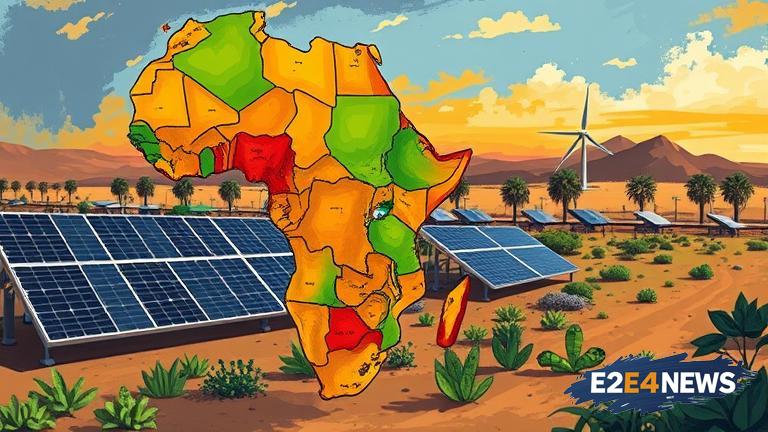The African continent is witnessing a significant shift towards renewable energy, driven by the need to address the pressing issues of energy access, climate change, and sustainable development. With many countries still struggling to provide reliable and affordable electricity to their citizens, renewable energy has emerged as a viable solution. Solar and wind power, in particular, have become increasingly popular due to their abundance and decreasing costs. Governments and private investors are investing heavily in renewable energy projects, with a focus on decentralized energy systems and off-grid solutions. This approach not only helps to reduce carbon emissions but also creates jobs and stimulates local economies. In East Africa, countries such as Kenya and Ethiopia are leading the way in renewable energy adoption, with a strong focus on geothermal and hydroelectric power. In West Africa, Nigeria and Ghana are making significant strides in solar energy development, with several large-scale projects underway. South Africa, meanwhile, is investing heavily in wind power, with several major wind farms operational or under construction. The African Union’s Agenda 2063 has set ambitious targets for renewable energy adoption, aiming for at least 50% of the continent’s energy mix to come from renewable sources by 2030. To achieve this goal, governments, international organizations, and private sector entities are working together to create an enabling environment for renewable energy development. This includes the development of supportive policies and regulations, as well as the provision of financing and technical assistance. The African Development Bank, for example, has launched a number of initiatives aimed at supporting renewable energy development, including the creation of a $500 million fund for renewable energy projects. Similarly, the International Renewable Energy Agency (IRENA) is working closely with African governments to develop national renewable energy plans and provide technical assistance. Despite the many opportunities and benefits associated with renewable energy, there are still significant challenges to be addressed. These include the need for greater investment in energy infrastructure, as well as the development of more effective policies and regulations to support the growth of the renewable energy sector. Additionally, there is a need for greater awareness and education about the benefits of renewable energy, particularly among local communities. To address these challenges, governments, civil society organizations, and private sector entities must work together to create a more enabling environment for renewable energy development. This will require a coordinated effort to develop and implement supportive policies, provide financing and technical assistance, and raise awareness about the benefits of renewable energy. In conclusion, Africa’s renewable energy revolution is gaining momentum, driven by the need to address the pressing issues of energy access, climate change, and sustainable development. With the right policies, investments, and partnerships in place, the continent can unlock its vast renewable energy potential and create a more sustainable and prosperous future for all. The growth of the renewable energy sector is expected to have a positive impact on the environment, as well as on local economies and communities. As the demand for renewable energy continues to grow, it is likely that we will see the development of new technologies and innovations, creating new opportunities for investment and job creation. Furthermore, the renewable energy sector is expected to play a critical role in helping Africa to achieve its sustainable development goals, including the reduction of poverty and inequality. Overall, the future of renewable energy in Africa looks bright, with many opportunities for growth and development in the years to come. The continent’s renewable energy revolution is not only good for the environment, but also for the economy and local communities. It is expected that the renewable energy sector will continue to grow and evolve, driven by advances in technology and innovations in financing and policy. As the continent continues to transition towards a more sustainable and renewable energy-based economy, it is likely that we will see significant economic, social, and environmental benefits. The African renewable energy market is expected to attract significant investment in the coming years, driven by the need for energy access and the growing demand for clean energy. This investment will not only help to drive economic growth but also create new opportunities for job creation and poverty reduction. In addition, the growth of the renewable energy sector is expected to have a positive impact on the environment, reducing carbon emissions and helping to mitigate the impacts of climate change. As the continent continues to develop and grow, it is likely that the renewable energy sector will play an increasingly important role in helping to achieve sustainable development goals. The future of renewable energy in Africa is exciting and full of opportunities, with the potential to create a more sustainable, prosperous, and equitable future for all. The renewable energy sector is expected to continue to evolve and grow, driven by advances in technology, innovations in financing and policy, and the growing demand for clean energy. As the continent transitions towards a more sustainable and renewable energy-based economy, it is likely that we will see significant economic, social, and environmental benefits. The growth of the renewable energy sector will not only help to drive economic growth but also create new opportunities for job creation and poverty reduction. In conclusion, Africa’s renewable energy revolution is gaining momentum, driven by the need to address the pressing issues of energy access, climate change, and sustainable development. With the right policies, investments, and partnerships in place, the continent can unlock its vast renewable energy potential and create a more sustainable and prosperous future for all.
